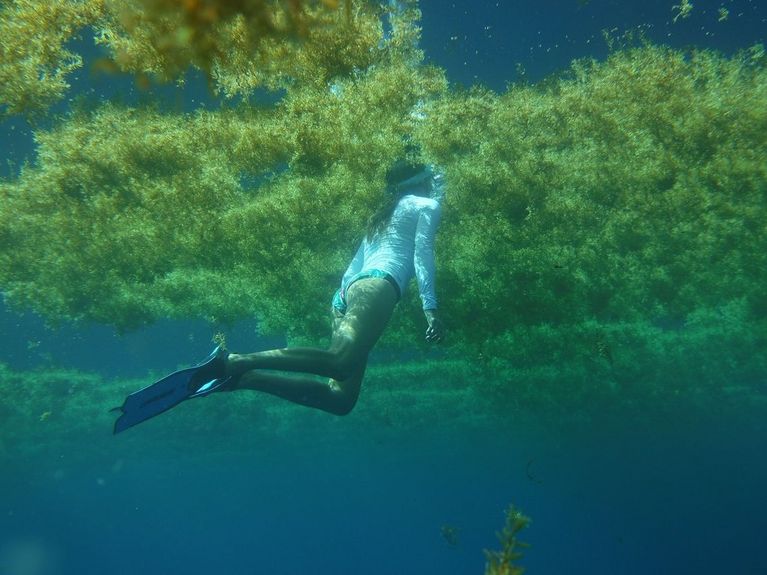Portrait
Algae farms for climate protection

Picture: private
Marine biologist Mar Fernández Méndez wants to set up large-scale aqua farms of the alga Sargassum, which can capture CO2 from the atmosphere and thus make a significant contribution to climate protection.
Initially, on the sandy beaches of Galicia, she would have preferred that there were no algae. "They always brush against your legs like that when you swim," says Mar Fernández Méndez, who is now one of the leading algae researchers. At the time, she was still a schoolchild from Madrid who always spent the long summer vacations with her grandmother in the countryside, in a house a few steps away from the sea. "But back then, when I put on my diving goggles and could see the seaweed streaking along my legs, I was fascinated."
The marine biologist has taken the dream beach of her childhood with her to the north. A photo of the coast hangs behind her desk at the Alfred Wegener Institute Helmholtz Centre for Polar and Marine Research (AWI) in Bremerhaven, right next to a large world map. From Spain to the world; a step symbolized by the pinboard. Mar Fernández Méndez is now traveling all over the oceans to uncover the secrets of algae, in Norway and Mexico as well as in the polar regions. At present, she travels particularly often from her Bremerhaven office to the Canary Islands: That's where a start-up is based that grew out of her research and received special funding from the German Federal Agency for Leap Innovation (SPRIND) just a few months after it was founded.
Mar Fernández Méndez. Picture: private
"Our goal is to grow a macroalgae called Sargassum in aquafarms," says Mar Fernández Méndez. Dense carpets are formed by this fast-growing algae, and as it grows, it captures lots of CO2. The algae are meant to grow in the open sea. When they are harvested, they can be used to produce raw materials for the chemical industry. MacroCarbon is the name of the newly founded company that aims to bind 100 million tons of CO2 emissions annually by 2040 and turn the carbon into raw materials. By comparison, total CO2 emissions in Germany in 2022 were about 660 million tons.
"What else could I have become other than a marine biologist," Mar Fernández Méndez asks with a laugh, "if I already have that name?" Mar, her first name, is the Spanish word for sea, and presumably her parents chose it for their firstborn child because they once met as sailing instructors on the coast. Mar decided to study biology, and she specialized in the sea the moment she learned that the oceans are where the greatest biodiversity is found. At the time, she was studying in Freiburg as an Erasmus student, and because she liked Germany so much and was now fluent in German, she looked for a suitable university with a marine focus for her doctoral thesis. Bremen was chosen, although a professor warned her that "not everywhere in Germany is like Freiburg." Mar Fernández Méndez remembers his words to this day: "Here in Bremen, for example, we recognize summer by the fact that the rain is warm!"
But the rain in Bremen didn't bother her. Why should it, when she could take part in expeditions all over the world for her research? She also went to the Arctic to research how this region changes and how algae influence the processes. Wherever there is enough light and nutrients in the ocean, algae grow. She is particularly interested in the macroalga Sargassum, which is at home in warmer regions, because it forms large carpets at the surface that then sink to the greatest depths. The CO2 is thus safely captured in a completely natural way. Fernández Méndez befriended Victor Smetacek, a professor emeritus at the AWI and one of the pioneers of ocean research. Together, they developed the idea of harnessing the potential of algae. It ought to be possible, they said to themselves, to grow the algae, and because they naturally float, this doesn't even require an elaborate infrastructure. The harvested algae are used to produce raw materials for the chemical industry, such as bio-naphtha (a type of raw gasoline), which can be used to replace products previously obtained from fossil fuels.
And so the marine biologist became a part-time entrepreneur: Together with the AWI and the specialized companies Carbonwave and Seafields, Mar Fernández Méndez founded her own company – . MacroCarbon is her second company having previously gathered important comrades-in-arms from scientists to start-ups to the chemical giant BASF in the C-Cause project ("Chemical Carbon Utilization through Sargassum Economy"). "With MacroCarbon, we are still in the experimental phase," says the marine biologist, who acts as managing director: Algae cultivation is being tested on a large scale on an ocean platform off the Canary Islands. The algae grow in the water and are immediately processed on top of the platform, that's the goal.
Despite her company in the southern climes, Bremen remains home for Mar Fernández Méndez: She has just bought and renovated a house in the north of the city with her husband and young son. She seems to have gotten used to the rain by now.
Readers comments